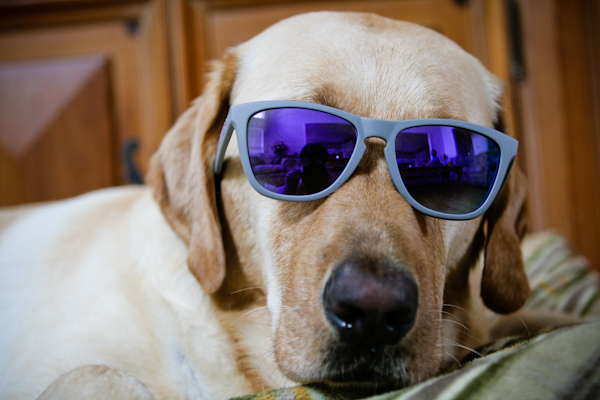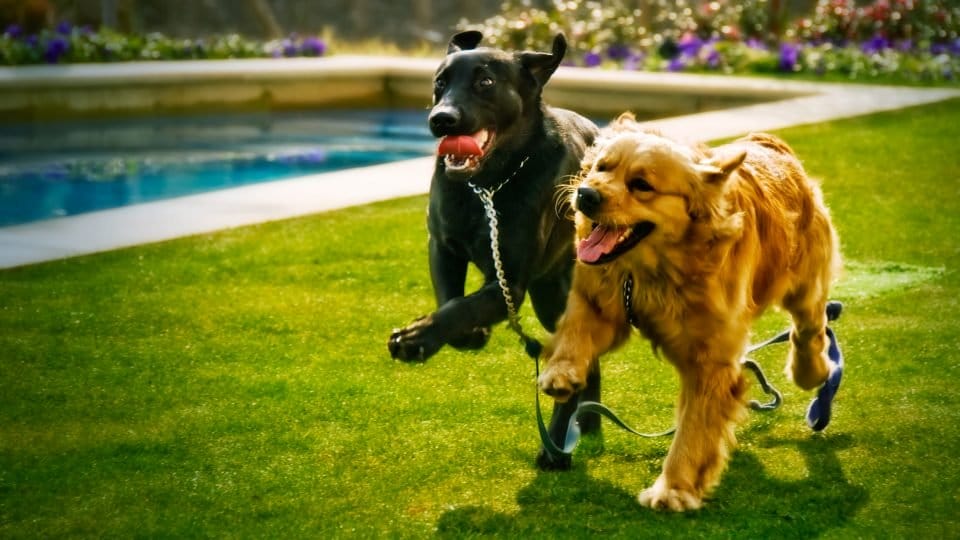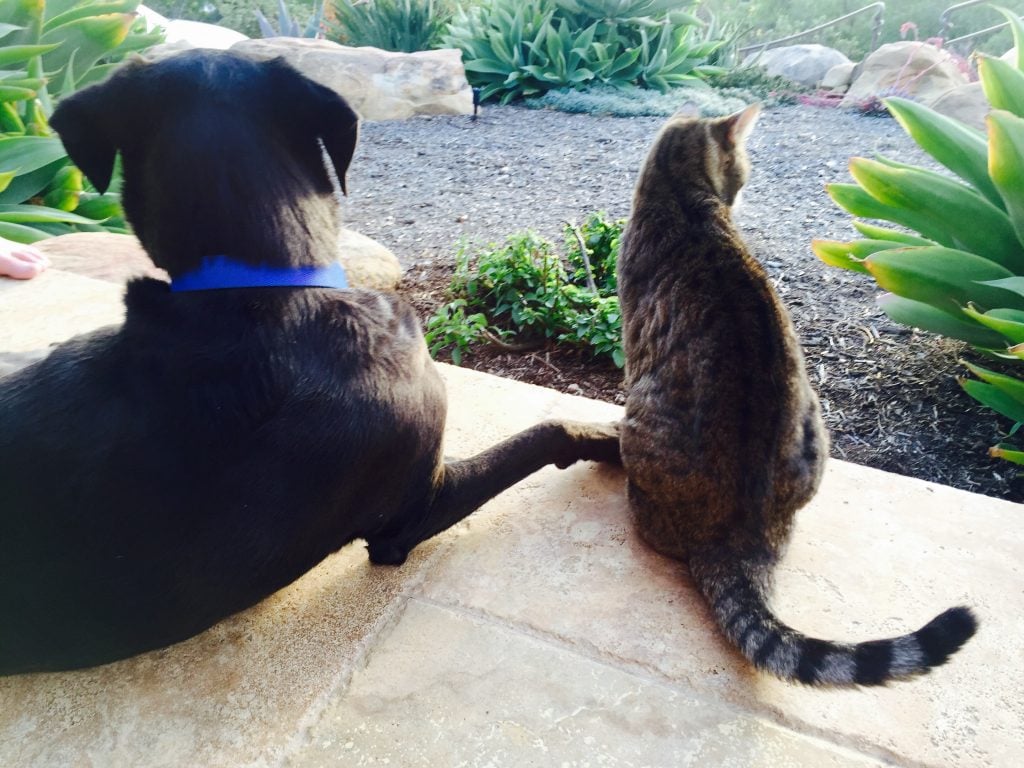Looking for a level-headed, lovable family dog? Retrievers are among the most popular dog breeds in the UK—but how do you choose between a Labrador retriever or a Golden retriever? They’re incredibly similar, sharing intelligence, high energy levels, and that adorable personality that dog lovers can’t get enough of!
These energetic hunting dogs have a lot in common, making it tricky for dog owners to favour one retriever breed over the other. To help you make an informed decision about your future family pet, we’ve put together an easy-to-read guide about these two popular breeds. Here’s a simple breakdown of the Golden Retriever vs. Labrador Retriever debate.

Via Flickr User Michael Gwyther-Jones

Via Flickr User Alonso Romero
Appearance
Traits shared by both Golden retrievers and Labrador retrievers:
- A height of 55-61 cm (22-24 in)
- Folded ears
- Long tails
- Happy, enthusiastic expressions
- “Soft mouths”
- Webbed feet
- A love of water
Traits unique to Golden retrievers:
- Flat or wavy coats
- Water-repellent coats
- Longer snout
- “Smiling” expression

Via Flickr User Egrego2
Traits unique to Labrador Retrievers:
- A broad head with pronounced eyebrows
- A water-resistant coat
- A medium, non-tapered muzzle
- A muscular build
Via Flickr User James Whitesmith
Golden Retriever Puppies and Labrador Puppies

Via Flickr User Paul David

Via Flickr User RD_Elsie
Both are too cute for words! Make sure you find a reputable breeder when you decided to get a puppy. The Kennel Club lists assured Labrador breeders and assured Golden retriever breeders on its site. When you’re ready to meet with lab or golden breeders, keep this checklist handy to make sure you get all the information you need.
- ask about the health history of both dog parents, including health screenings and vet checkups
- ask for a record of immunisations
- observe the dog parents’ temperaments and personalities
- choose a puppy that appears healthy (check his coat, ears, and eyes)
- choose a puppy who plays good-naturedly and isn’t timid or anxious
Quick Retriever Breed Facts and History
Labrador retrievers and Golden retrievers are always listed amongst the most popular dog breeds in the UK. Both retrievers share a common ancestor in the St. John’s Water Dog (aka: the lesser Newfoundland). This extinct breed originated in Canada and was exported from Newfoundland to the UK in the 19th century.
St. John’s Water Dogs were bred to help fishermen drag their nets across the ice. These retrieving traits have been passed down to the breeds’ modern day ancestors, making Goldens and labs powerful swimmers.
Life Expectancy
- Golden retrievers: 10-13 Years
- Labrador retrievers: 10-12 Years
Weight
- Golden retrievers: 25-34 kg (55-75 lbs)
- Labrador retrievers: 29-36 kg (65-80 lbs)
Cost
Prices can vary. On average, Golden retrievers cost around £670. Labrador retrievers cost an average of £490.
You can also find breed-specific rescues if you’re interested in adopting. The Kennel Club also has excellent lists of Labrador retriever rescues as well as Golden retriever rescues on their site.
Lab and golden mixes are often available for adoption at your local shelter. If you adopt a mixed-breed dog, you can always use a dog DNA test—Wisdom Panel, in particular, receives high marks for accuracy—to get more insight into their unique heritage.
Coat Colour
Labrador retrievers come in three colours: chocolate, yellow, and black.
Golden retrievers, on the other hand, come in a variety of shades, ranging from a creamy blonde to an almost reddish hue.

Via Flickr User Marvin Kuo

Via Flickr Use RD_Elsie
Health Problems
Health issues that Golden retrievers and Labrador retrievers share:
- High cancer risk
- Obesity
- Hip dysplasia
- Ear infections
Health issues specific to Labrador retrievers:
- Entropion: an abnormality of the eyelids in which the eyelid rolls inward, irritating the cornea.
- Malformation of knees and elbows.
- Laryngeal paralysis: an illness affecting older labs that partially paralyses the voice box, resulting in a muffled bark and difficulty breathing.
Health issues specific to Golden retrievers:
- Elbow dysplasia: similar to hip dysplasia, this is caused by abnormal growth in the elbow joint.
- Seizures
- Skin issues such as hot spots

Via Flickr User Pete Markham

Via Flickr User RD_Elsie
Grooming
Labradors and Goldens are notorious shedders, so both breeds require regular grooming. Both breeds have double coats, and they go through two big sheds per year.
While labs have shorter hair and don’t need regular trimming, their double coat will still need routine maintenance.
Goldens sport those long luxurious coats, so you’ll need to regularly use an undercoat rake to prevent the hair from matting. They’ll also need regular trimming around their extra feathery areas such as the ears, neck, and tail.
Activity Level and Temperament
Bred as hunting companions, labs and goldens are members of the sporting dogs group. They were designed to be active with their human partners all day—swimming, running, and of course, retrieving game. This means that they’re best suited to an active lifestyle. They’re both ideal breeds if you enjoy jogging, walking, and exploring.
Both goldens and labs are highly intelligent dogs and excel in different roles, working as service dogs, guide dogs, and search and rescue dogs.
One thing to keep in mind if you’re considering adding a retriever to your family: these breeds are not particularly good guard dogs. While their friendly demeanour makes them exceptional family pets, it also makes them less of a threat to intruders.
Labs and goldens are family dogs to their core, and they want to spend time with their favourite people. They don’t do well when left to their own devices and will need a trusted pet sitter or dog walker to help out if you’re not available during the day.
So with all these similarities, how do you choose? Hopefully, this guide solves your debate between a Golden retriever vs. Labrador retriever.
Another way to determine which breed is right for you is to spend some time with these amazing dogs. Since both breeds are so popular, it shouldn’t be too hard to find one at the dog park or a local meetup. Contacting breeders is also a great way to get some basic information about the temperament and the history of dogs in their line. Or, perhaps, volunteering at a breed-specific rescue could help make your decision.
No matter which breed you choose, you’ll be gaining a lovable family member. And nothing beats that.
___
Featured image via Flickr / josh




